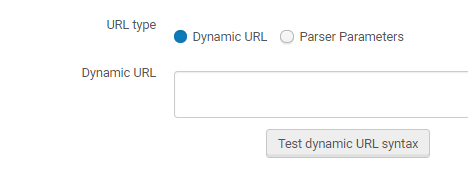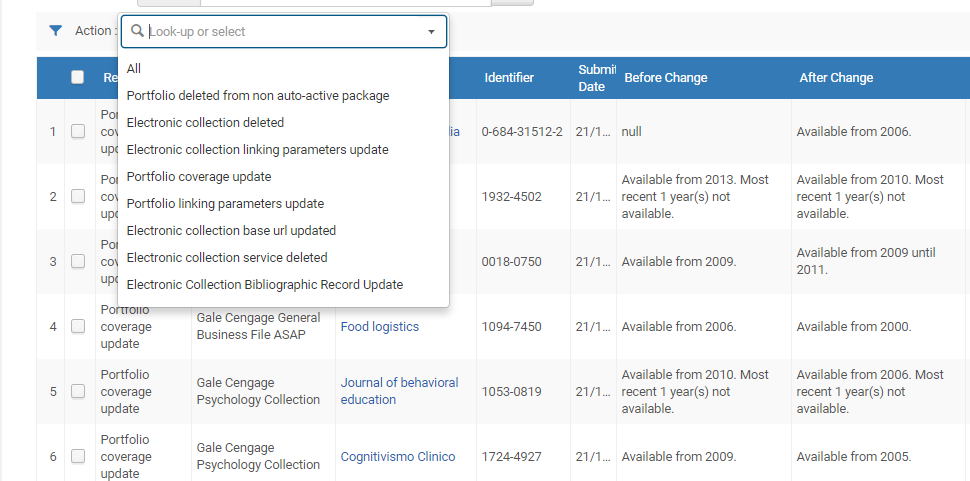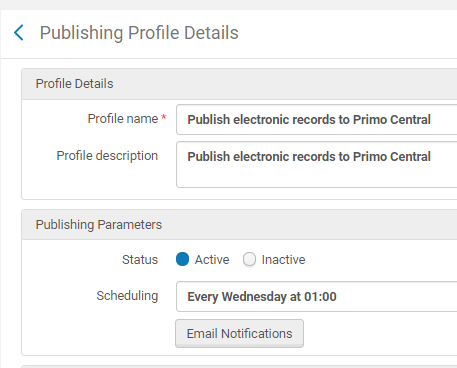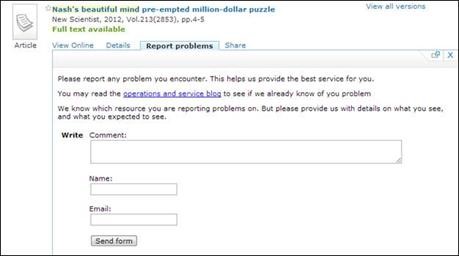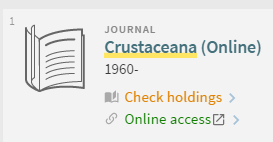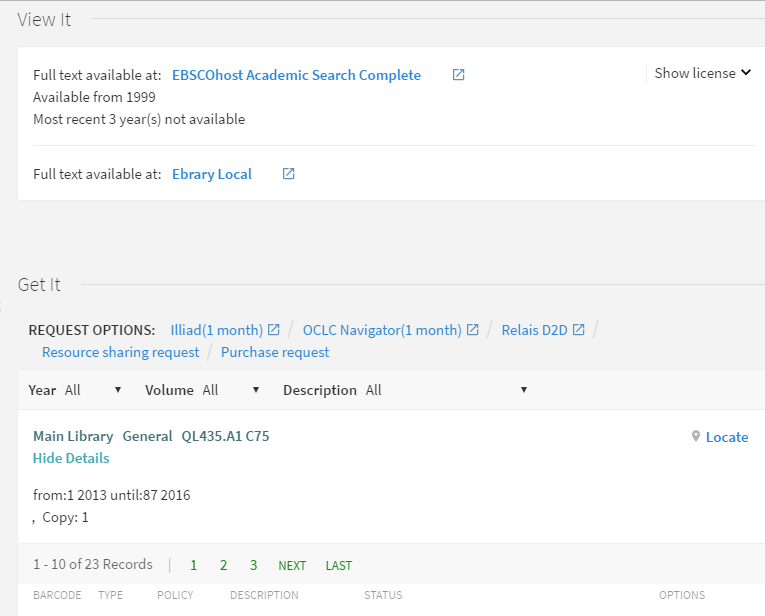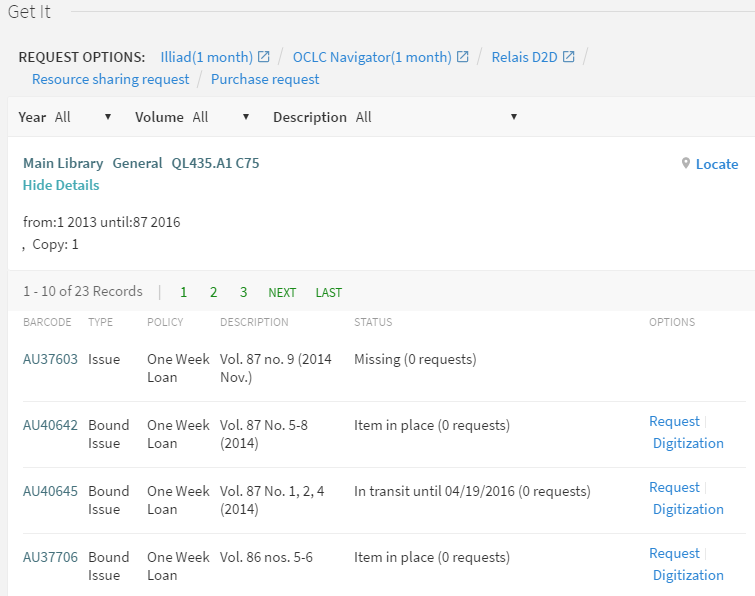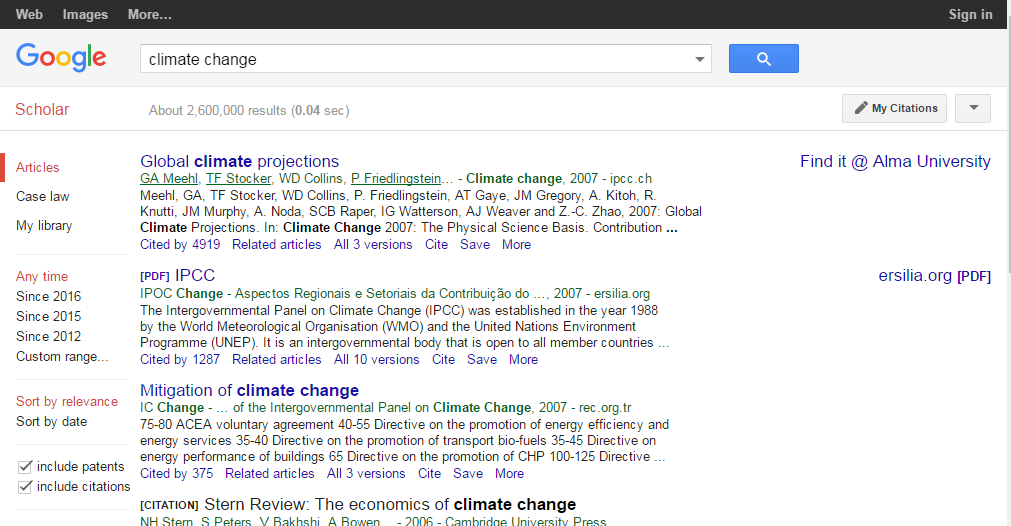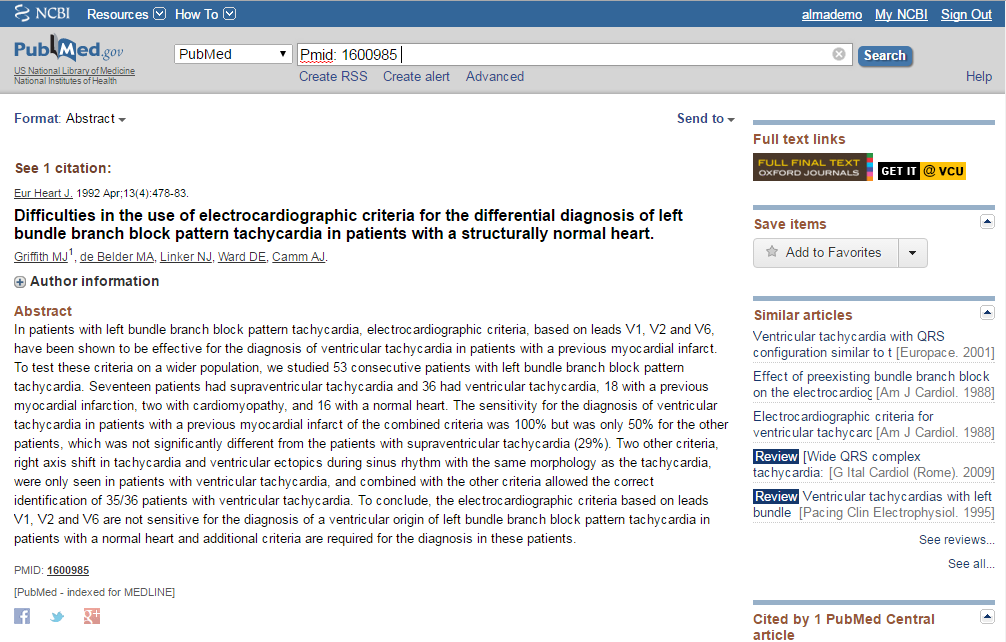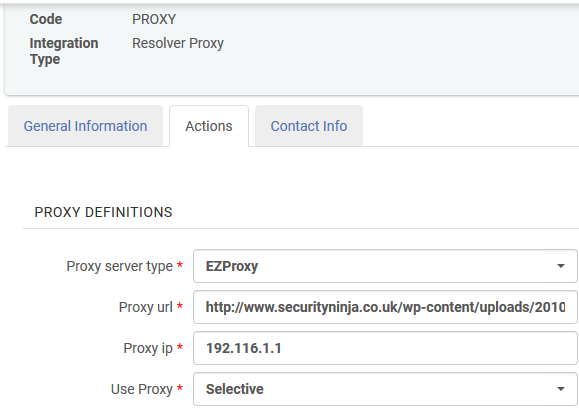Link Resolver
What link resolver is available in Alma?
Alma includes an embedded Link Resolver which provides patrons with context-sensitive electronic, digital and print services. The embedded link resolver is a standard functionality in Alma (no additional subscription fee is required) and is based on Ex Libris’ experience delivering the SFX link resolver to over 2500 institutions worldwide.
The Alma link resolver offers services via a menu that can be customized by the institution, defining the labels of the services and the order which they appear.
In addition, the institution can define display logic rules among services based on local preferences; for example, if an electronic journal is available from more than one provider, the institution can boost one provider over the other. The institution also can define logic rules among different service types, such as not offering a document delivery service if a full text service exists for the electronic resource. An example of these library configurable rules can be seen in the following screen capture:
When the OpenURL resolves to multiple records, Alma will attempt to merge equivalent records into one unified list of services. When the records are deemed non-equivalent the user will be presented with a list of records based on the institution’s defined display logic rules among services.
If only one resource is found, the library can configure the link resolver to link directly to the electronic resource, bypassing the electronic service page:
Alma augments the OpenURL in various ways (e.g. DOI) , and from various sources such as Crossref, Pubmed and more in order to enrich the context object and provide enhanced link resolution.
CKB electronic resources can be localized to reflect institution-specific information such as administrative/access information, coverage information for electronic journal titles, public notes, etc.
Does Alma include the full functionality of SFX?
Alma includes most of SFX functionality as well as additional functionality. As it is a link resolver of a unified system it provides services not only for e-resource material, but also for print material.
Does Alma support OpenURL and context sensitive services?
The Alma link resolver offers these services via a menu that can be customized by the institution, defining the labels of the services and the order in which they appear. In addition, the institution can define display logic rules among services based on local preferences; for example, if an electronic journal is available from more than one provider, the institution can boost one provider over the other. The institution also can define logic rules among different service types, such as not offering a document delivery service if a full text service exists for the electronic resource. The institution can also configure the link resolver to link directly to the electronic resource, bypassing the electronic service page.
The linking parameters will be predefined for instance for individual journal collections and other electronic material from the CKB, but information can be edited:
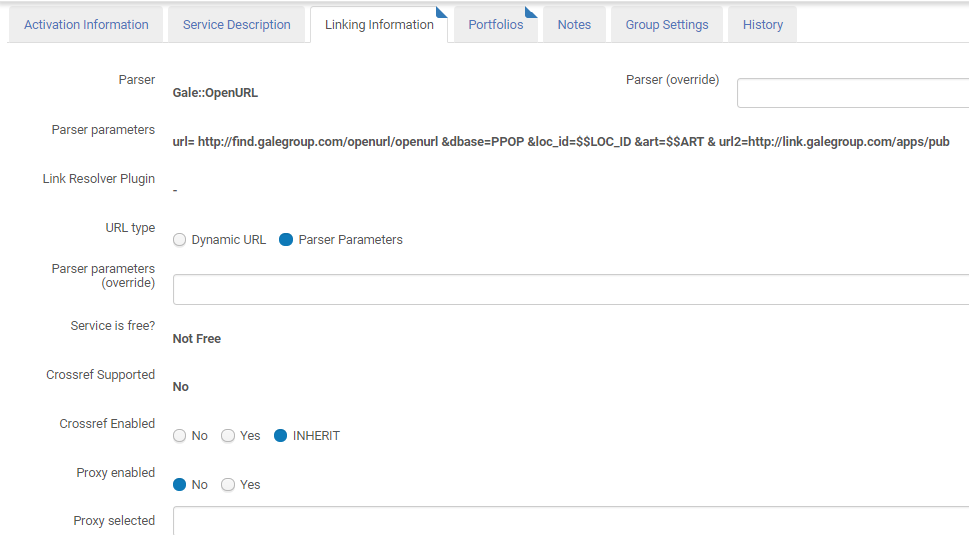
Note for instance how the library can override parser information, define a proxy, etc.
Can library staff create dynamic URLs?
Instead of managing static links for local electronic collections and portfolios, staff users can create sophisticated dynamic URLs for local electronic collections and portfolios and embed OpenURL metadata information dynamically. In addition, users can utilize dynamic URLs to override linking provided by the community knowledge base.
The Electronic Service Editor and Electronic Portfolio Editor pages enable a staff user to define a list of conditions that are used to select a linking URL for the service or portfolio, respectively.
Each condition starts with an IF statement that checks for the existence of ContextObject and OpenURL parameters. If all parameters exist for a condition starting at the top of the list, the specified URL for that condition is used for linking. Otherwise, the next condition will be checked, and so forth.
For example:
IF (rft.issn, rft.year, rft.volume)
http://www.publisher.com/{rft.issn}/{rft.year}/{rft.volume}
IF (rft.issn, rft.year)
http://www.publisher.com/{rft.issn}/{rft.year}
IF (rft.issn)
http://www.publisher.com/{rft.issn}
IF ()
http://www.publisher.com
Dynamic URL Condition List
If the first condition is met in the above example, the resulting dynamic URL may look something like the following:
http://www.publisher.com/1364-0321/2010/2
Select Test dynamic URL syntax to verify the syntax of your conditions.
Can Alma augment the OpenURL metadata content where necessary?
Alma augments the OpenURL in various ways (e.g. DOI) , and from various sources such as Crossref, Pubmed and more in order to enrich the context object and provide enhanced link resolving.
How does the link resolver manage electronic journals with no ISSN?
If the OpenURL does not contain an ISSN, Alma will attempt to match by title.
How does Alma handle cases where the OpenURL resolves to multiple records?
Alma will attempt to merge equivalent records into one unified list of services. When the records are deemed non-equivalent the user will be presented with a list of records based on the institution’s defined display logic rules among services.
Does Alma provide link resolution testing functionality?
Testing of link resolution functionality of e-resources originating in the Community Zone are managed by Ex Libris. Staff are able to view a report of various changes to e-resources including linking parameter updates:
If a collection or journal is activated in Alma will the articles in Primo central for a journal title in this package also automatically be activated?
Alma supports a publishing profile to Primo Central, If this profile is activated, then Primo Central will have a full text indication for the articles of the journal that that was activated in Alma.
How does Alma respond when a link does not produce expected results or provides an incorrect full text resource?
Any error reporting or support for resolving issues related to OpenURL linking is part of Ex Libris’ standard support services. Additionally, patron feedback/support requests can be integrated directly into the Primo interface:
It is also possible to report an issue related to packages and portfolios to Ex Libris directly from the Alma interface. This is achieved by clicking a “Send to Ex Libris” link from within the record itself.
Creating a proprietary service for retrieving feedback information using the general electronic service functionality in Alma is also possible.
Does Alma provide an alternative to OpenURL in the event that the OpenURL link fails?
Alma link resolver is based on the OpenURL standard.
Incoming requests to the link resolver for available services are only based on OpenURL.
Outgoing links to providers content is based on HTTP requests that are based on the provider's link syntax, which can be OpenURL or any other HTTP syntax.
Can the link resolver offer multiple linking options - including print?
The link resolver will link to all available options. An example can be seen following (in Primo) of a record with print and electronic versions of a record. Users can check the availability for the electronic version via the View It and the print version from the Get It:
Patrons have access to the full text versions (View it):
And can view the items in the library’s repository (Get It):
How does the Open URL links appear in other services, such as Google Scholar or other third party databases?
See screenshots provided for how the links display in Google Scholar and an example of how they could display in a third party database:
EZProxy
How is EZProxy managed and integrated in Alma?
Integrated into Alma’s embedded link resolver is a redirection into a proxy server instead of directly to a vendor platform, to provide access to the full text of a resource.
As with all integrations between Alma and other systems, the definition of the institution’s proxy server is managed in an “External System Integration Profile”. This profile encapsulates all the needed definitions for the link resolution component to create a correct URL to the Proxy Server. Alma supports EZProxy, LIBProxy and WAM.
The Alma Link Resolver responds to an incoming OpenURL and changes it to an electronic link by automatically including additional proxy information in the resolved URL. Some institutions use a single proxy server, in which case one proxy profile should be defined. If an institution uses several proxy servers, a proxy profile should be defined for each proxy server. You must then define the relevant proxy for each electronic collection, service, or portfolio.
Usage
Does Alma support usage statistics via COUNTER?
Alma facilitates the collection and reporting of usage statistics information supplied by vendors (content providers) in COUNTER 4 format.
Support for COUNTER 5 as well as SUSHI lite is on the Alma Roadmap.
Ex Libris is closely following developments in the industry regarding these protocols and will incorporate them into Alma in a timely manner as the industry develops.
Alma Analytics provides usage statistics reporting capabilities that enable the creation of reports such as usage statistics by journal, database, publisher, platform, and subscriber. The reports enable the library to drill down on data elements included in the report such as year range, titles, etc.
COUNTER statistics can be either loaded automatically or manually.
How does Alma deal with non-COUNTER compliant publishers' statistics?
Alma also collects data on the usage of electronic resources via the Alma link resolver. These include OpenURL requests, services offered to the patrons, and services which the patron chooses to use. Usage of electronic resources tracked via the link resolver can also be used for reporting using Alma Analytics. This aggregated data can easily provide multi-year usage trend reports per title, publisher, and platform.
Total views:
14000
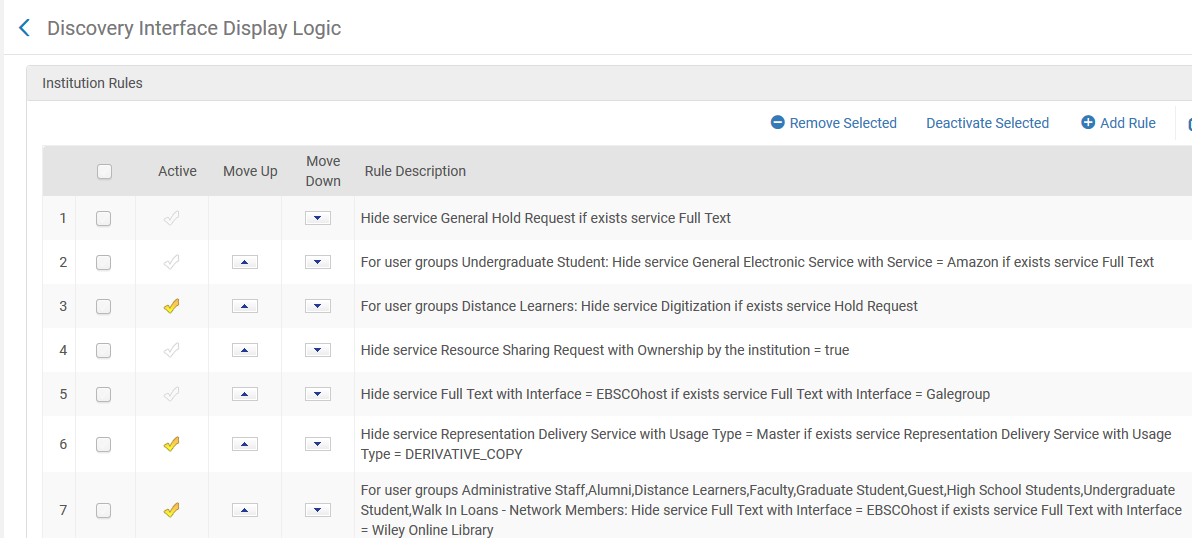
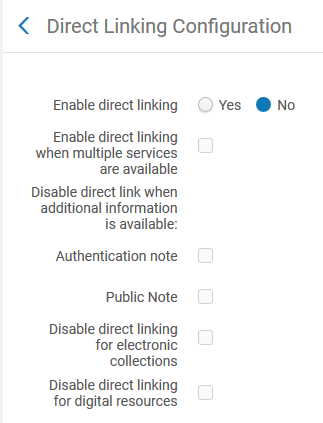
 Note for instance how the library can override parser information, define a proxy, etc.
Note for instance how the library can override parser information, define a proxy, etc.